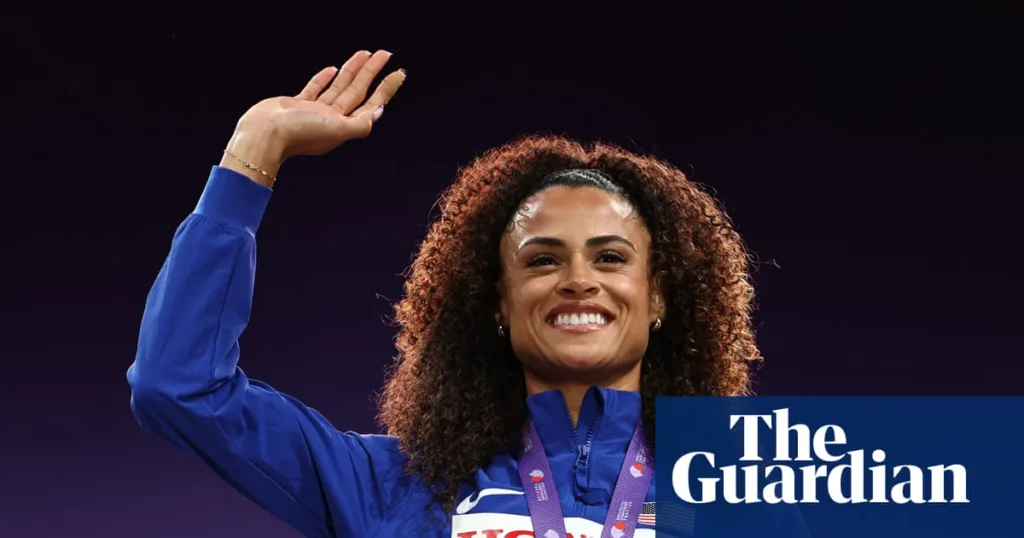As Sydney McLaughlin-Levrone and Marileidy Paulino whisked around the final bend of the 400m final at the World Championships in Tokyo, did McLaughlin-Levrone think back to when Paulino handed her just one of two career losses in the event in Paris two years prior? Probably not, though she certainly had reason to. The New Jerseyan led most of that 2023 race, surging to an early advantage from the inside lane and maintaining it for three-quarters of the course. But she’d gone out too hard. The 400-meter is a cruel trial, just too long to sprint flat-out the entire way, just too short to save meaningful reserves. McLaughlin-Levrone erred on the side of aggression and paid the price in that unforgiving final straightaway. Paulino flew past her and finished comfortably in front. On Thursday night, Paulino once again seemed to creep up on McLaughlin-Levrone in the middle of the final 100.
This time, however, McLaughlin-Levrone maintained her advantage in the dying meters, form smooth and languid as Paulino’s grew ragged and bouncy. Paulino ran one of the best 400m flat races ever, clocking in at 47.98 seconds, the third fastest time to date, and more than a full second faster than her winning time in Paris two years earlier. Without McLaughlin-Levrone in the race, she’d have been the talk of the day. With the American around, all headlines concerned her supernatural 47.78. It was the fastest time run in four decades; the one remaining time faster than McLaughlin-Levrone’s, run by Marita Coch, was thought by many to be unbreakable and bears suspicion that performance-enhancing drugs greased the track.
By the way: the 400m flat is not McLaughlin-Levrone’s best event.
McLaughlin-Levrone is at her sharpest over the same distance, but with hurdles to jump over as well. Of the 10 fastest times in the history of the women’s 400m hurdles event, McLaughlin-Levrone owns six, including the top three. Since breaking the world record for the first time, with a 51.90 in 2021, she has shaved another second and a half off her time. Her coach, the ambitious Bobby Kersee, told the AP she wants to break 50 seconds. Now that McLaughlin-Levrone has added the second-fastest 400 flat time to her resume, talk has already begun of a double gold medal at the 2028 Los Angeles Olympics. Never mind that the schedule would have to change for this feat to be possible, with more space between the two events to enable sufficient rest in the interim; nobody doubts McLaughlin-Levrone’s ability to win both events.
Told that World Athletics president and gold medalist Sebastian Coe wanted to see her in the 800m after the race, McLaughlin-Levrone at first widened her eyes in mock fear. “You’ve already conquered two events, could there be a third?” the reporter asked. McLaughlin-Levrone grinned cheekily. “No comment,” she said. Why rule out anything when you’re on top of the world?
Sydney McLaughlin-Levrone of Team United States crosses the finish line to win the gold in the 400m final on Thursday in Tokyo. Photograph: Hannah Peters/Getty Images
At 26 years old, McLaughlin-Levrone has already compiled a significant legacy. Her dominance over the 400m hurdles event, even among the best ever over a given distance, is striking. Femke Bol, the Dutch hurdler, would have the top three times in the event if McLaughlin-Levrone didn’t exist: a sublime talent eclipsed by a generational one. Now, shortly into her 400-meter flat career, McLaughlin-Levrone has already posted the second best time ever run. The prospect of dominance over two events brings to mind a name explosive on the track and sedentary in retirement: Usain Bolt. Then there’s McLaughlin-Levrone’s impact on how to run the 400 hurdles: McLaughlin-Levrone takes 14 strides, rather than the traditional 15 in the women’s race, between certain sets of hurdles.
Given her trajectory so far, the best of Sydney McLaughlin-Levrone may still be in the future. In that light, trying to classify her entire career is fairly absurd. On the other hand, with her résumés, how could you not?
McLaughlin-Levrone’s prowess on the track has made it easy to classify her as oneof the best ever, even if comparing athletes in different events remains a sticky exercise. Jacqueline Joyner-Kersee (who once trained under Bobby Kersee and is now married to him) has the six best-ever scores in the heptathlon. They have remained unequaled for more than three decades. The retired sprinter Allyson Felix medaled in every Olympics from 2004 to 2020, in a variety of sprint disciplines. Outside the US, there’s Shelly-Ann Fraser-Pryce’s 100m supremacy and her famous longevity, Faith Kipyegon’s versatility to set records in vastly different distances, and so much more in so many different events.
McLaughlin-Levrone’s greatness, while difficult to compare to the greats before and now, is undeniable. Hear it from one of her fiercest rivals, to the extent an athlete as dominant as McLaughlin-Levrone can have rivals: “I think that very soon the women’s 400m world record will be broken,” said world bronze winner Salwa Eid Naser, who alongside Paulino owns the rare honor of once beating the American in this event. “I never thought of it before, but after tonight’s race I can see it is around the corner.” McLaughlin-Levrone’s performance was historically great, but for it to suddenly convince a top competitor that something previously thought out of reach is in fact imminently reachable? If Naser is saying that, it’s hard for anybody else to be over the top in their praise. If McLaughlin-Levrone gets the grace of a schedule change in 2028 and attains that double gold medal, she might well vault beyond anybody who came before.
Discover more from 6up.net
Subscribe to get the latest posts sent to your email.


